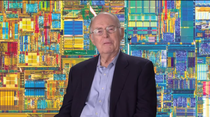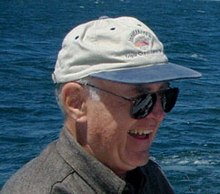Gordon Moore: Difference between revisions
expanded |
m infobox |
||
| Line 20: | Line 20: | ||
| citizenship = |
| citizenship = |
||
| nationality = American |
| nationality = American |
||
| fields = |
| fields = Entrepreneur <br> [[Electrical engineering]] |
||
| workplaces = [[Intel]]<br>[[Gordon and Betty Moore Foundation]]<br>[[San Jose State University]]<br>[[University of California, Berkeley]]<br>[[California Institute of Technology]]<br>[[Johns Hopkins University Applied Physics Laboratory]] |
| workplaces = [[Intel]]<br>[[Gordon and Betty Moore Foundation]]<br>[[San Jose State University]]<br>[[University of California, Berkeley]]<br>[[California Institute of Technology]]<br>[[Johns Hopkins University Applied Physics Laboratory]] |
||
| alma_mater = [[San Jose State University]]<br>[[University of California, Berkeley]]<br>[[California Institute of Technology]] |
| alma_mater = [[San Jose State University]]<br>[[University of California, Berkeley]] (B.S., 1950))<br>[[California Institute of Technology]] (Ph.D., 1954)) |
||
| thesis_title = I. Infrared Studies of Nitrous Acid, The Chloramines and Nitrogen Dioxide II. Observations Concerning the Photochemical Decomposition of Nitric Oxide |
| thesis_title = I. Infrared Studies of Nitrous Acid, The Chloramines and Nitrogen Dioxide II. Observations Concerning the Photochemical Decomposition of Nitric Oxide |
||
| thesis_url = http://search.proquest.com/docview/302028299 |
| thesis_url = http://search.proquest.com/docview/302028299 |
||
| Line 36: | Line 36: | ||
| influences = |
| influences = |
||
| influenced = |
| influenced = |
||
| awards = [[John Fritz Medal]] {{small|(1993)}}<br>[[IEEE Founders Medal]] <small>(1997)</small>< |
| awards = [[National Medal of Technology]] {{small|(1990)}}<br>[[John Fritz Medal]] {{small|(1993)}}<br>[[IEEE Founders Medal]] <small>(1997)</small><br> [[Computer History Museum]] Fellow <small>(1998)</small> <ref>[http://www.computerhistory.org/fellowawards/hall/bios/Gordon,Moore/ Gordon Moore 1998 Fellow]</ref> <br> [[Othmer Gold Medal]] {{small|(2001)}}<br>[[Perkin Medal]] {{small|(2004)}}<br>[[Nierenberg Prize]] <small>(2006)</small><br>[[IEEE Medal of Honor]] <small>(2008)</small><br>[[Presidential Medal of Freedom]] |
||
| signature = <!--(filename only)--> |
| signature = <!--(filename only)--> |
||
| signature_alt = |
| signature_alt = |
||
Revision as of 14:53, 5 January 2015
| External videos | |
|---|---|
 | |
Gordon Earle Moore (born January 3, 1929) is an American businessman and co-founder and Chairman Emeritus of Intel Corporation and the author of Moore's Law.[3][4][5][6] As of January 2015, his net worth is $7.2 billion.[7]
Education
Moore was born in San Francisco, California, and grew up in nearby Pescadero. He attended Sequoia High School in Redwood City. He received a Bachelor of Science degree in chemistry from the University of California, Berkeley in 1950 and a PhD[8] in chemistry and minor in physics from the California Institute of Technology (Caltech) in 1954.[9] Prior to studying at Berkeley, he spent his freshman and sophomore years at San Jose State University, where he met his future wife, Betty. Moore completed postdoctoral research at the Applied Physics Laboratory at the Johns Hopkins University until 1956.[10]
Career
Moore joined MIT and Caltech alumnus William Shockley at the Shockley Semiconductor Laboratory division of Beckman Instruments, but left with the "traitorous eight", when Sherman Fairchild agreed to back them and created the influential Fairchild Semiconductor corporation.
In July 1968, Robert Noyce and Moore founded NM Electronics which later became Intel Corporation, and Moore served as Executive Vice President until 1975 when he became President. In April 1979, Moore became Chairman of the Board and Chief Executive Officer, holding that position until April 1987, when he became Chairman of the Board. He was named Chairman Emeritus of Intel Corporation in 1997.
Moore has been a member of the Board of Directors of Gilead Sciences since 1996, after serving as a member of the company's Business Advisory Board from 1991 until 1996.[11]
University donations
Moore has been a member of Caltech's board of trustees since 1983, chairing it from 1993 to 2000, and is now a life trustee.[12][13][14] With his wife he endowed the Gordon and Betty Moore Foundation. In 2001, Moore and his wife donated $600 million to Caltech, the largest gift ever to an institution of higher education.[15] He said that he wants the gift to be used to keep Caltech at the forefront of research and technology.
On December 6, 2007, Gordon Moore and his wife donated $200 million to Caltech and the University of California for the construction of the Thirty Meter Telescope, the world's second largest optical telescope. The telescope will have a mirror 30 meters across and be built on Mauna Kae in Hawaii. This is nearly three times the size of the current record holder, Large Binocular Telescope.[16]
Awards and honors
In 2001, Moore received the Othmer Gold Medal for outstanding contributions to progress in chemistry and science.[17][18]
In 2002, Moore received the Bower Award for Business Leadership. In 2003, he was elected a Fellow of the American Association for the Advancement of Science. He was awarded the Dan David Prize for 2010 Future - Computers and Telecommunications.[19]
The library at the Centre for Mathematical Sciences at the University of Cambridge is named after him and his wife Betty,[20] as are the Moore Laboratories building (dedicated 1996) at Caltech and the Gordon and Betty Moore Materials Research Building at Stanford.
The Electrochemical Society presents an award in Moore’s name every two years to celebrate scientists’ contributions to the field of solid state science.[21]
Moore was awarded the 2008 IEEE Medal of Honor for "pioneering technical roles in integrated-circuit processing, and leadership in the development of MOS memory, the microprocessor computer and the semiconductor industry."[22] Moore was featured in the documentary film Something Ventured which premiered in 2011.
Moore is a member of the National Academy of Engineering. He is the recipient of the National Medal of Technology and the Presidential Medal of Freedom, the United States' highest civilian honor. In 1998 he was inducted as a Fellow of the Computer History Museum.
Personal life
Moore enjoys many different recreational activities, including car painting and making model airplanes. He has said his conservation efforts are partly inspired by his interest in fishing.[23]
In 2011, Moore's genome was the first human genome sequenced on Ion Torrent's Personal Genome Machine platform, a massively parallel sequencing device. Ion Torrent's device obtains sequence information by directly sensing ions produced by DNA polymerase synthesis using ion-sensitive field effect transistor sensors.[24]
References
- ^ Gordon Moore 1998 Fellow
- ^ "Gordon Moore". Forbes. Retrieved July 11, 2011.
- ^ published in an article April 19, 1965 in Electronics Magazine
- ^ Gordon Moore at DBLP Bibliography Server
- ^ Gordon Moore author profile page at the ACM Digital Library
- ^ Attention: This template ({{cite doi}}) is deprecated. To cite the publication identified by doi:10.1145/253671.253746, please use {{cite journal}} (if it was published in a bona fide academic journal, otherwise {{cite report}} with
|doi=10.1145/253671.253746instead. - ^ "Gordon Moore". Forbes. Retrieved January 3, 2015.
- ^ Moore, Gordon Earle (1964). I. Infrared Studies of Nitrous Acid, The Chloramines and Nitrogen Dioxide II. Observations Concerning the Photochemical Decomposition of Nitric Oxide (PhD thesis). California Institute of Technology.
- ^ "Caltech Commencement Program" (PDF). Caltech Campus Publications. June 11, 1954. Retrieved March 29, 2013.
- ^ "Gordon E. Moore". Computer.org. Retrieved June 14, 2013.
- ^ "Gilead – Investor Relations – Biography". Investors.gilead.com. Retrieved July 11, 2011.
- ^ "Sally Ride, David Lee Named Caltech Trustees, Ben Rosen Named Trustee Chair". Caltech. December 4, 2000. Retrieved December 10, 2013.
- ^ "Technology Pioneer Gordon Moore is Caltech Commencement Speaker". Caltech. May 3, 2001. Retrieved December 10, 2013.
- ^ "Trustee List". Caltech. Retrieved December 10, 2013.
- ^ "Intel Founder Gives $600 Million to Caltech". New York Times. October 28, 2001. Retrieved December 10, 2013.
- ^ Thirty Meter Telescope Moves Forward, Sky & Telescope, August 2007
- ^ Voith, Melody; Reisch, Marc (May 14, 2001). "Gordon Moore Awarded the Othmer Gold Medal". Chemical & Engineering News. 79 (20): 62. doi:10.1021/cen-v079n020.p062. Retrieved June 12, 2014.
- ^ "Past Winners of the Othmer Gold Medal". Chemical Heritage Foundation. Retrieved June 12, 2014.
- ^ "Gordon E. Moore". Dan David Prize. Retrieved August 18, 2014.
- ^ Betty and Gordon Moore Library
- ^ "ECS Society Awards". The Electrochemical Society.
- ^ IEEE Medal of Honor Recipients
- ^ Charlie Rose, November 14, 2005
- ^ Attention: This template ({{cite doi}}) is deprecated. To cite the publication identified by doi:10.1038/nature10242, please use {{cite journal}} (if it was published in a bona fide academic journal, otherwise {{cite report}} with
|doi=10.1038/nature10242instead.
External links
- The Fairchild Chronicles
- Gordon E. Moore Association by the Horatio Alger Foundation
- Childhood Home of Gordon Moore in Pescadero, CA
- Biography at Intel website
- Forbes.com: Forbes World's Richest People
- Moore says nanoelectronics face tough challenges – By Michael Kanellos, CNET News.com, March 9, 2005
- [1]
- Interview with Caltech News
- Dedication of Moore Labs at Caltech
- The Accidental Entrepreneur, (Gordon E. Moore): From Caltech to Intel
- 1929 births
- American billionaires
- American businesspeople
- American physical chemists
- California Institute of Technology alumni
- Giving Pledgers
- IEEE Medal of Honor recipients
- Intel people
- Living people
- Members of the United States National Academy of Engineering
- National Medal of Technology recipients
- Businesspeople from San Francisco, California
- Presidential Medal of Freedom recipients
- San Jose State University alumni
- University of California, Berkeley alumni
- Berkeley Student Cooperative alumni

